#rural livin
Explore tagged Tumblr posts
Text

giant fifty foot 1000 year old historic dogwood tree i get to stare at whenever im waiting for my bus
#this picture doesnt even BEGIN to show the actual scale of how tall it is. mf is huge#my grandparents dont own the property this tree is on but they do own property of a small dogwood forest with some other#historically protected trees. that i get to watch out my window when im doing homework#rural livin' 🫡#txt#aesthetic
4 notes
·
View notes
Text
The Sharmas, and vegetarianism in India
I just finished the books and this stood out to me. One side of my family is Jain, a small religion philosophically very similar to Buddhism, with a similar emphasis on nonviolence and the complete avoidance of harm to any human being. This includes:
No meat, obviously. Eggs are also excluded (as in the more general Indian definition of vegetarianism) No root vegetables, even, because you have to kill the whole plant to get them. Interestingly, non-lethal animal products are fine - milk, honey, wool - so it's not the same as veganism. I'm not sure what the position is on the hidden life-cost of milk i.e. the death of male calves because it's a waste to keep most around. This is common enough that retaurants will have 'Jain options' on their menu/allow you to request a Jain version of a dish, and it's a widely understood dietary requirement (though most people in India seen to think Jainism is a branch of Hinduism. It's not, it's a completly splintered-off heterodoxy, but we don't need to get into that).
They also don't use leather or silk since that does require death to produce, though my granny does have a 'peace silk' sari that's made without boiling the cocoons.
No eating after sunset and no eating food kept overnight, because they had some concept of germ theory and knew that bacteria bred more after dark. Pre-fridges, this is generally a pretty good idea in a hot country, anyway.
A yearly ritual where you meditate and ask forgiveness from any creature of any kind that you might have injured, deliberately or not. It's meant to be an acknowledgement that you've done wrong and a meditation on forgiving other people because everyone's fallible. You also exchange this with anyone you can - friends, family etc. I have very very mixed feelings about this one, how valid and meaningful it usually is in-practice and its actual effect on most people's mental health, but I'll leave that out of this post LOL
In the same vein, a prayer ritual you do at the temple where you repeat the same request for forgivness while repeatedly moving from a standing position to kneeling and prostrated with your head on the floor, the gradual standing - kneeling upright - kneeling fully - completely prostrate timed to the lines of the request. As my mum pointed out, it's also pretty good exercise, like a slowed-down bungee squat that's also gentler on your joints. I can picture El doing it for mana.
If you thought this was intense enough, the monks and nuns take it to another level. They eat nothing but boiled vegetables, lentils and grains, and I believe are not allowed to wear any clothing but what is purely plant derived, so they are closer to veganism in that sense. They have little brooms they use to sweep the path ahead of them to avoid stepping on insects (which, since they spend a lot of time on the road physically walking from place to place, presumably slows them down as much as you might imagine. They wear masks over their face to avoid inhaling small insects and keep out bacteria as much as possible (presumably the tiny insects are more of a concern if, again, you're pretty much sleeping out in the open in a rural area).
Not Jain any more, but upper-caste Hindus from some regions, essentially the priest caste, are also pretty strict vegetarians to the point that they're quite snobby about it. They are vegetarian because they consider it necessary to ritual purity, and look down on people who aren't - according to my mum, who went to uni with a lot of people like that, the reason why they accepted her relatively easily was because she was also a very strict vegetarian. I'm not sure if those guys avoid root vegetables too - mum had to start eating them at uni, anyway, because she would have struggled for food otherwise.
The Sharma family's insistence on strict mana reminded me of these practices a lot. They won't use any malia because you cannot get it without deliberately causing harm to another living being, even if that's just a blade of grass. I don't know if Novik was aware of this but it's pretty plausible and if she was, it adds a lot of context to her making El half-Indian and giving her paternal family similar beliefs. My headcanon is that they are indeed Jain - there's a pretty big community in Maharashtra/of Marathi origin.
#el higgins#the scholomance#a deadly education#the last graduate#the golden enclaves#arjun sharma scholomance#deepthi sharma scholomance#galadriel higgins#via shitposts
62 notes
·
View notes
Text
Friday May 5.
Farmcore.
Rural is as rural does.
Ahhh. The sun rising over the distant fields. The soft choruses of the animals. The tractor in the distance, standing still and silent against the horizon, waiting for another day's leisurely labor. The rustle of trees gently swaying. Morning mist wafting from the mouth of a dog, who pants quite happily. Mother duck leading along her little gang of baby ducks. The intense, hot smell of cow sh*t. There's nothing quite like #farmcore.
Farmcore? What the flip is farmcore?, you ask, brow furrowed. Well, it's really rather straightforward. It's the appreciation of all things rural, pastoral, and farm-ish. If your kind of culture is agriculture, then farmcore is not just the aesthetic, neigh, but the way of life for you.
Get busy livin', or get busy ploughin'
481 notes
·
View notes
Text
📢 SKANZEN Set Pt1 UPDATE !!
2024/03/30 UPDATE Weird window glitches which occured when the windows were placed on diagonal walls were fixed.
67 notes
·
View notes
Note
This might be a bit of a random and tangety question, but I was wondering if y’all also experience the erasure of people already livin’ in areas about to be or in the process of gentrification.
Cause I’m from the Mornington peninsula, this relatively mid sized region in Australia, some of it can be pretty rural, over all we have a population density of 230 per square km (which is 88 per square mile??) which is mostly because of the few bigger population centres.
Anyhow when I was growin’ up the ninch (as we call it) was seen as this largely poor, backwards, farming/fishing region full of conservatives who hated outsiders or somethin’ (to be honest the last part is correct)
But these days a lot of people have shifted from viewing people on the ninch from backwards hill dwellers to… not even existing?
A lot of our towns are seen as desirable as holiday realestate but this hasn’t rehabilitated people from the ninch in the eye’s of outsiders but instead they just ignore that we are even here, and that they are displacin’ us.
Does this happen in gentrified parts of Appalachia or are outsiders still hostile to locals?
i definitely do still notice hostility, but in a way, it can absolutely be framed as them just... not seeing us, like you said. they aggressively want to scrub clean the culture n the people to get to the pretty parts, to the point where, no, they don't consider us unless they're looking down on us as they "clean up the place."
ppl will come here n complain about how UnSaFe it is cause they hear guns going off in the woods with ppl just mindin their business, hunting on their own land or just shootin having fun. they come here n mock our accents and the way we live, pearl clutching bc they have to drive two hours away to get to a Target. then they just start filling in the commercial gaps instead of accepting that just aint how we live here. things like that.
basically, they want a pretty lil mountain view out the back of their vacation home, but they don't actually want the mountains; they want it to be like where they came from. hell, sometimes they dont even want the view. theyll flatten ridges to build their mcmansions instead. so, no, gentrification definitely hasn't redeemed appalachians in the eye of the general public that flock here, either.
anyway, solidarity <3 sounds like there's a lot in common between our region and yours
17 notes
·
View notes
Text



Some lovely lads I’ve gotten recently, livin rural makes it tough to get the chess Pikmin but I prevail
24 notes
·
View notes
Text
Show Boat (1936)

The 1936 film adaptation of "Show Boat," directed by James Whale, encapsulates the ideological tensions of its source material. It addresses issues of racism, appropriation of black culture, women's independence, and the clash between rural and urban identities, presenting a nuanced exploration of these complex societal issues against the backdrop of early 20th-century America.
Racism is central to the film and is represented through characters like Julie La Verne. Julie's experiences as a woman of mixed race expose the deeply ingrained prejudices and systemic discrimination prevalent in the segregated South. Her portrayal highlights not only the challenges faced by individuals navigating their racial identity but also the cultural appropriation rampant in the entertainment industry at the time. Through Julie's character, "Show Boat" offers a critique of the hypocrisy and cruelty of racial segregation, shedding light on the profound injustices endured by marginalized communities.
Parallel to its exploration of racism, the film also grapples with the evolving role of women, exemplified through Magnolia Hawks. Magnolia's journey towards independence and self-discovery challenges traditional gender norms, as she breaks free from societal expectations to pursue her passion for performing. Her character arc reflects broader shifts in gender dynamics during the early 20th century, as women began to assert their autonomy and challenge restrictive gender roles.
The film also discusses broader cultural anxieties about modernity, urbanization, and mass culture prevalent in early 20th-century America. Regionalism, depicted as a nostalgic longing for rural authenticity. The film's portrayal of rural landscapes and folk culture serves to counterbalance the homogenizing effects of modernity and technology.

As Joe sings "Ol' Man River," the lyrics depict the toils and struggles of African American laborers working along the Mississippi River. The lyrics "Ah gits weary An' sick of tryin' Ah'm tired of livin' An' skeered of dyin', But ol' man river, He jes'keeps rolling' along" encapsulates the resignation and fatalism felt by those trapped in cycles of poverty and oppression. Through this repetition, the song emphasizes the relentless, unyielding nature of the river—a metaphor for the forces of societal injustice that weigh heavily on Joe and his community.
The musical number also serves as a poignant commentary on the exploitation of black labor by white employers. Joe's lyrics lament the backbreaking work endured by black workers, contrasted with the privilege and indifference of the wealthy elite who benefit from their labor. Lines like "He don' plant taters, He don't plant cotton, An' dem dat plants'em is soon forgotten, But ol'man river, He jes keeps rollin'along," highlight the dehumanizing nature of the labor system, where black workers were expected to toil endlessly with little reward or recognition.
Furthermore, the lighting and cinematography during this musical number are carefully orchestrated to evoke a sense of mood and atmosphere. Soft, diffused lighting creates a sense of melancholy and introspection, highlighting the somber tone of the song's lyrics. Additionally, long shots and wide angles are employed to capture the expansive landscape, reinforcing the sense of isolation and insignificance felt by the characters in the face of societal oppression.
In essence, "Show Boat" offers a complex portrayal of American identity and cultural dynamics, highlighting the interplay between race, gender, and regionalism amidst the backdrop of a rapidly changing society.
@theuncannyprofessoro
4 notes
·
View notes
Text

THE ONLY SECONDS THAT MATTER
CHAPTER TWENTY-THREE IS UP!
Genre: Contemporary Romance Rating: 18+
Includes: Extensive horse nerdery + cowboys, mxm romance (1 trans + 1 cis), some discussion child abuse, some instances of trans/homophobia (it is rural Oklahoma, y'all), depression, occasional sex scene (but it’s a slow burn for sure)
Victor Ortiz-Bennett had some reservations about moving to Oklahoma, but his late aunt willed him a 70-acre horse farm, and he decides to fulfill his dream of running and operating his own training facility. Victor’s been around the reining horse show circuit for a while, and he’s ready to settle down, travel less, and spend more time with the horses he loves and away from the people he can do without. That is, until he picks up a horse at an auction with a bucking problem he can’t fix, and he has to take her to the one guy who can ride anything– Johnny Stearns, a retired professional rodeo rider.
Johnny Stearns is loud, chatty, eccentric, and fears nothing, exactly Victor’s opposite. However, Victor finds himself sinking into an odd friendship with this new foul-mouthed cowboy without a filter, diving deeper into the mess that is Johnny’s life until there’s no way to extract himself from it. Johnny may talk a tough game, but there’s more to him than he’ll let most people see. Victor knows getting in too deep will mean a rough ride, but if there’s anything Johnny’s taught him, it’s how to stay in the saddle.
Excerpt:
“Who was that person—guy—from last night?”
“What guy?” When Victor saw Johnny’s dead-eyed expression, he continued, “Oh, right, that guy. Just a date. Nothing serious.”
“What do you mean, nothing serious?”
“Well, he lives in Forth Worth and I live in Oklahoma, so—”
“How long have you known him?”
“Less than a week. Why, are you jealous?”
“No. Just wonderin’.”
“Hmm.”
“Seemed kinda…” Johnny rolled his tongue against his cheek a moment.
“Kinda what?”
“Oh, you know.”
Victor raised an eyebrow.
Johnny lifted a hand and let it go limp at the wrist.
“What’s wrong with that?” Victor asked.
“Nothin’. Just didn’t think you were into that sort. I thought he was a girl. Looked like one, too.”
“You have no clue what I’m into.”
“You were into me.”
“And how did that go? God, Johnny, I just wanted one night of uncomplicated fun. Don’t read more into it than there is.”
“You have sex?”
“That’s none of your business. Should I remind you that you were seeing and sleeping with Daisy for two months and you didn’t say a thing to me?”
“We only slept with each other, like…” Johnny had to take a moment to think about it, “twice, and she talked me into it both times. I have a hard time sayin’ no to her. It wasn’t my idea.”
Victor had to laugh a little, even if it came from a place of helplessness. “Right, you just tripped and fell into her vagina, I’m sure.”
“It beats drinkin’.”
“Why are you here?” Victor had to ask, because this conversation was going nowhere.
“I told ya, I felt like drinkin’ so—”
“Seems like it’s partially you wanting to ask me about my date from last night, which you have no right to know about. So if all you want is information on who I fuck in my free time, I’m going to have to ask you to leave.”
“All I’m wonderin’ is why you can run around with this stranger but when I suggested we casually mess around, you acted like I slapped you across the face.”
“Because I know you. It’s completely different.”
“I don’t see it that way.”
“Good for you. I don’t.”
“Sorry, but you were askin’ for way too much. I know you’re a Californian boy and you think that the whole world is cool with the queers now, but small town Oklahoma is still livin’ in the 1930s. If you wanted to have a cute lil public gay life with a partner, you shoulda moved to Massachusetts.”
2 notes
·
View notes
Text
We want to give some context for "Livin' the Dream!" Because we have some.
The first and last time we've heard that phrase, and we heard it repeatedly every day for two and a half years, was when we worked for an international footwear company headquartered in a small town of rural Western Washington.
This company was an E.S.O.P. or Employ-owned Stock Option Plan. Which is corporate speak for "We want you to believe this is a co-op, but it isn't."
They regularly talked about wanting their employees to "drink the koolaid." And harbored the desire for all of us to make that company our entire life, while at the same time talking about work/life balance.
This was from 2009 to 2012.
We heard "Livin' the Dream!" from a tiny handful of obviously stressed people. But primarily, like 99% of the time, it came from this one bald salesman.
Not that being bald is typically an indicator of anything, but he clipped his remaining hair super short. And he looked good that way. But, it was a low maintenance kind of deal, allowing him to focus on his numbers.
We don't know what's happened to him. We're the ones who burnt out first, as one of the graphic designers. We burnt out due to being autistic and trans and plural and closeted and never meant for any kind of full time job.
Our whole point here is that the one person we knew who said this every single day, was a sales rep for a tiny international company that was trying too hard to grow bigger as fast as possible. If you've worked with and alongside sales reps, you know what this means.
The weirdest, most David Lynchian bullshit we've ever seen pulled in the name of office politics was done by sales reps, because of the pressure they're under.
He wasn't the senior rep, but he was working on it.
2-3 times a day, he'd say he was livin' the dream.
When we first saw this post, we were going to reblog it by adding: "Livin' the Dream!" = "Help, I'm a sales rep. Please kill me. I'm too far gone."
But "Actively daydreaming about swan diving into a wood chipper" explains everything we ever saw in that man's face.
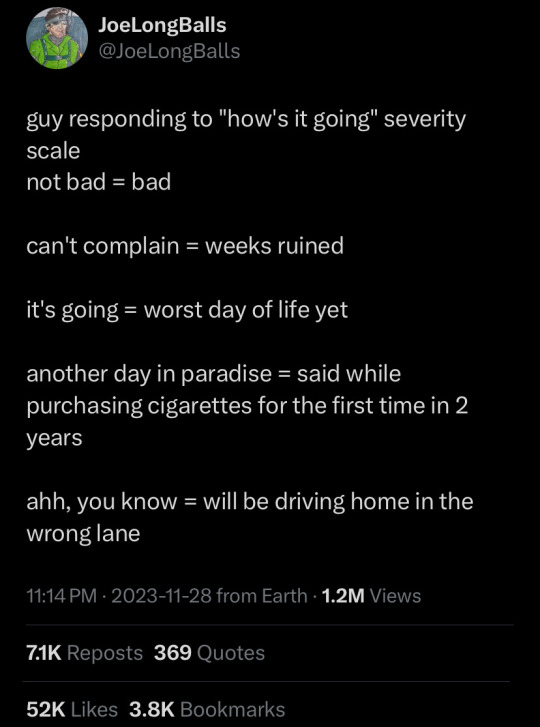
132K notes
·
View notes
Note
how its like livin in transylvania? i dont know shit about it but i can imagine castles and i love that, there are no castles in this stupid country where i live
It’s not all castles and rural, there’s a full on city here too but tbh it’s not that bad here.
0 notes
Text
Mom found out the other day that she is in fact not her father’s daughter. Grandma was livin a double life out in rural New York apparently.
1 note
·
View note
Text


Por Pablo Albán Rodas 11 de agosto de 2023 Florida, USA
Un trueno brama como el acorde de la guitarra gigante cuyo mango se hunde entre las nubes grises del medio día en esta parte de La Florida. El hotel y casino Hard Rock guarece a centenares de personas de toda edad que huyen del calor de más de cien grados fahrenheit, pronosticado con atino por los noticieros de la mañana.
El monumento apoteósico al género musical los recibe con el verso de Aerosmith “Livin´it up when I´m going down”[i] grabado en un pasamano del ascensor-cilindro de luces neón púrpura, que sube y baja a turistas, melómanos y ludópatas por las entrañas del edificio. El nivel dos es destino preferido para los que no son huéspedes. Un mural en el fondo con los trajes originales de los personajes principales del musical El Mago de Oz: Dorothy, el León y los hombres de hojalata y de paja. La placa memorial testimonia que en el 2007 el grupo británico Artic Monkeys[i] ganó el premio al vestuario bizarro: “estos chicos saben que la irreverencia en el rock es crucial”.
Un poco más allá, los amplios ventanales de un largo pasillo acercan el celeste cristalino de la guitarra: un complejo hotelero compuesto por 638 habitaciones y suites, con más de 450 pies de alto. Al otro lado la galería con reliquias originales del guitarrista holandés Van Halen, del trio de punk rock B´52, de las portadas de álbumes de acetato del Elvis de los años 50 y algo del vestuario de Sargento Peper, el larga duración que The Beatles publicaron en los 60´s.
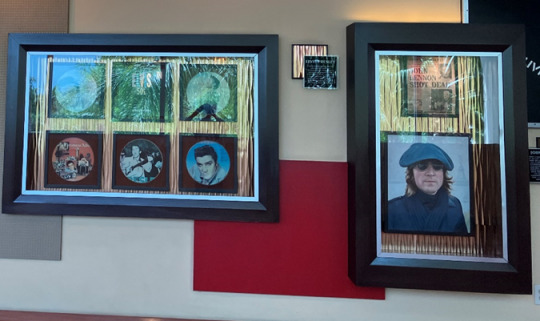
“I don`t care too much for money, money can´t buy me love”[i]: la estrofa anti capitalismo de la canción icono del grupo británico dispuesta en el umbral del casino es un conjuro liberador del poder del dinero que al rato contrasta con decenas de discos de oro chispeantes que forran una pared de más de 10 metros de alto.

El olor a cigarro, las luces multicolor y el sonido electrónico y metálico de traga monedas inunda el ambiente de varias salas de juego. En los flancos se ven las mesas de Black Jack o veintiuno y las ruletas que funcionan con el horario 24/7. Las salas de póker son privadas. Los motivos musicales decoran buena parte del ambiente “gambler”, evocado hace décadas por Kenny Rogers en discos de acetato y película de carrete.
Nada está demás, pues el Country y folk rural anglosajón en virtuosa fusión con el Blues de los negros esclavizados y sujetos de apartheid y el jazz mestizo que repletaba galpones clandestinos y desvencijados en los extramuros de las aún no tan boyantes ciudades gringas sureñas de la primera mitad del siglo pasado, son las fuentes primarias del rock and roll. Eran momentos de prohibicionismo, cuando el espíritu puritano era política oficial en distritos, condados y estados de la unión.
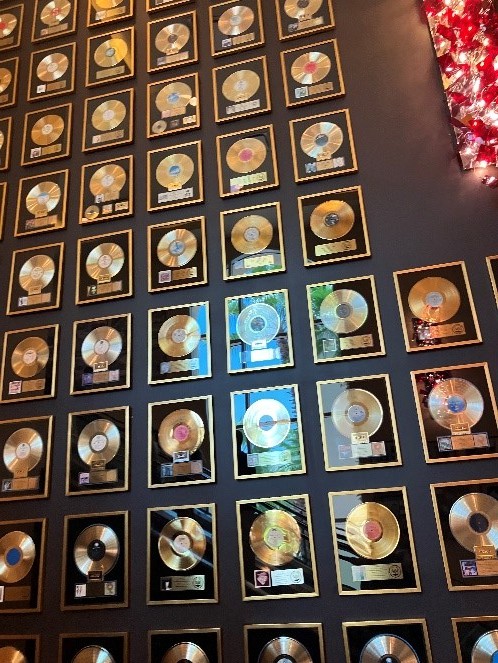

La liberación se siente y aprecia un poco más allá, en la zona de shopping, donde una galería ofrece por miles de dólares, retratos y pinturas con imágenes de Jimmy Hendrix o Prince, junto a Marilyn Monroe, Charles Chaplin y Batman.
Aunque esa historia no interesa para el común de los visitantes, ansiosos por captar una y otra vez los mejores recuerdos con las cámaras de los celulares. El mostrador más fotogénico reúne vestuarios de Madonna, Rozonda “Chilli” Thomas y Cher, las sexis del jet set de los 80.

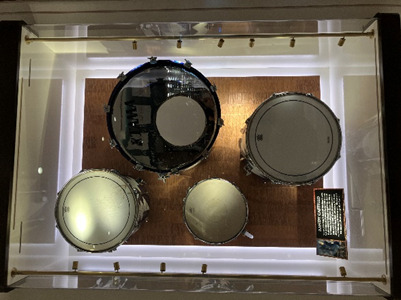
También ocupa su lugar la batería autografiada de Randy Castillo, un nativo americano de la nación Apache que ejecutó sus artes junto a Ozzi Osbourne, Mötley Crüe y Lita Ford y que en 2002 falleció de cáncer: “el mundo de la música perdió uno de sus hijos favoritos”, reza su placa[1].
EL ANCESTRO ETNICO Y ANTISISTEMA PREVALECE
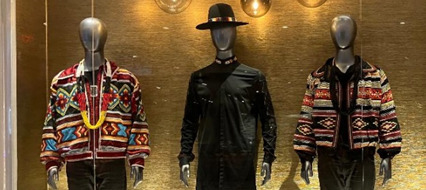
En la misma área de juegos de azar hay otra instalación más grande y visible, donde se exhiben piezas de vestuario con diseños geométricos de acento amerindio.

Las usaron los músicos Taboo y los hermanos Spencer y Doc Battiest miembros de la tribu Seminola de Florida. En 2017 recibieron el premio MTV Music Award al mejor vídeo de la categoría “Fight Against the Sistem”, con el himno de protesta “Stand Up/Stand N Rock”[i], en contra de la construcción del oleoducto Dakota Acces,Magnificent Seven.
Los Semínola también están representados en un cuadro con fotos vintage que para muchos pierde sentido y se convierte en un detalle más de este fabuloso escenario barroco.
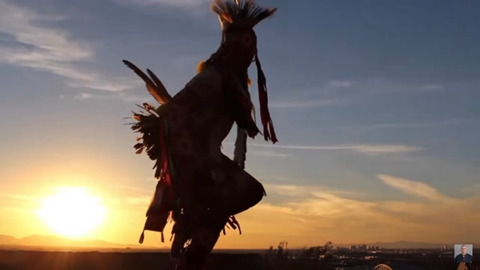
Sin embargo, el ancestro étnico es preponderante para los gerentes y propietarios del lujoso complejo. La historia del Hard Rock recogida en redes dice que abrió sus puertas en 1970 en Londres, inspirado en la canción Morrison Hotel de The Doors.
En 1978 abrió una sede en Toronto, Canadá y en los años 80 inició la expansión global hasta que en los 90 pasa a propiedad del Rank Group, representado por Peter Norton. En 2007 la franquicia fue adquirida por la Nación Semínola de Florida. Hablan el Muscogui y se llaman a sí mismos Ikaniuksalgi, que significa “gente de la península”. Al momento son 175 locales en 53 países. El de guitarra que rasga el cielo, es el más grande.
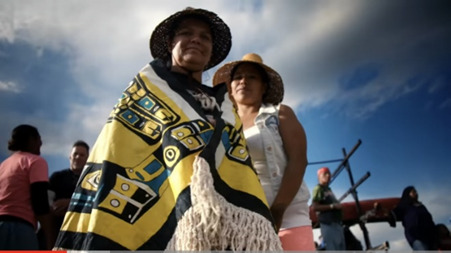

[1] https://youtu.be/h3Yrhv33Zb8 Love in an Elevator, Aerosmith.
[1]https://youtu.be/RgJcLGCSU4k Arctic Monkeys @ Brit Awards 2007
[1] https://youtu.be/srwxJUXPHvE Can´t buy me love, The Beatles.
[1] https://youtu.be/Onyk7guvHK8 stand up/stand n rock
1 note
·
View note
Text
feelin a little bad bc I went on a very nice date tonight and he was very into me but tbh I matched with someone who’s vibes even through the phone are just so immaculate like I actually sent him the like and I usually just sift through the ones I get and don’t pursue but the vibes were that good
anyway the immaculate vibes guy is sending absolutely novels of messages and this most recent one he was answering me talking about growing up rurally and sharing that this is the smallest town he’s lived in and he’s always lived in cities and I cannot help myself because I’m
JUST A SMALL TOWN GIRL
LIVIN IN A LONELY WORLD
and he’s
JUST A CITY BOY
and I guess I won’t Stop Believing
0 notes
Text
Robert Finley Interview: Something to Laugh About

BY JORDAN MAINZER
The most stunning and heartbreaking song on blues singer Robert Finley's latest album Black Bayou (Easy Eye Sound), is made up. On album closer "Alligator Bait", the narrator--at first talking rather than singing--describes trudging through the swamp, his grandfather having just purchased for him a pair of hip boots. Backed by Kenny Brown's spindly guitars, Eric Deaton's slinky bass, and Jeffrey Clemens' slow-burning, stomping drums, Finley's gruff voice tells the story of this character wading around, waiting for something to happen. He accidentally steps on an alligator's back, thinking it's a log; his grandfather shoots the gator after it reacts. Matter-of-fact, Finley states, darkly humorous, "A lotta kids got ate like that." But on the second half of the song, he sings, wailing like a bluesman who had his heart broken. Only this time, he's taken aback by familial betrayal, realizing his grandfather had only bought him the hip boots and told him to enter the swamp in order to use him as alligator bait. When the narrator goes home to tell his father, his father laughs and brushes him aside, confessing that the same thing happened to him when he was a kid. Most of us face a mini existential crisis when we learn our parents aren't perfect. The narrator of "Alligator Bait", on the other hand, has just learned of his own dispensability.
When I spoke to Finley over the phone a few days before Black Bayou was released in late October, he confessed, "'Alligator Bait' was supposed to be cheerful. I didn't want to make him look like a mean old grandpa. It's just something to laugh about," before pausing and adding, "Maybe it'll make some kids stay away from the creek." Indeed, seven years into his improbable comeback, Finley views his role as a singer and entertainer as twofold: meeting the audience at the heart while simultaneously giving them advice, telling them the barebones truth when other authority figures won't. On Black Bayou, he reckons with ideas of homesickness and loneliness, lust and love, selflessness and salvation. Buoyed by longtime collaborator Dan Auerbach of The Black Keys, Finley wrote all of the songs in the studio, and his familiarity with his supporting cast of musicians resulted in songs that were both efficiently recorded and emotionally acute. Brown's guitar winces with longing on "Livin' Out A Suitcase" as Finley's tired of traveling. On "Waste Of Time", a song that sees Finley taking pride in rural living even if it means missing out on opportunities provided by cities, the buzz-saw guitars and Clemens' clattering percussion yield a perfect maximalism to go along with Finley's claims that, yes, there's still a lot to digest right outside your doorstep. "There are so many guys down here with super talent," Finely said. "They haven't been exposed to the right places."
In fact, Finley's daughter and grandaughter, Christy Johnson and LaQuindrelyn McMahon, offer a prototype. Like many musicians and singers in rural Louisiana, Johnson had long been singing at church, specifically in the youth choir before she started traveling with her father, joining him on his 2019 America's Got Talent stint and eventually recording background vocals on 2021's autobiographical Sharecropper's Son. And Finley insisted to Auerbach on McMahon singing backup on Black Bayou, though she's also in her own band, according to Finley. After all, there's not much of a difference between blues and gospel music. As Finley puts it, it's just "Oh, baby!" versus "Oh, lord!"
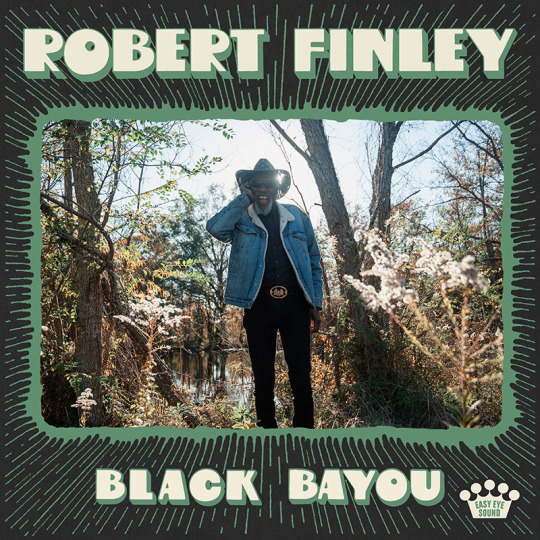
Really, Finley feels his songs could essentially soundtrack various milestones or important events in life. He made sweet doo wop outlier "Lucky Day" for others. "It's a wedding song. It's for people celebrating their 50th anniversary," he said. "It's one of those songs you can use in different situations." In contrast, he describes "Susie Q"-esque lurker "What Goes Around Comes Around" as "basically scripture," even as he sings lines like, "I got my whiskey and my woman / I ain't worried about a thing." Living the way you want and keeping to yourself can be a holy exercise, too. "They're the true facts. No sugarcoating," Finley said, adding, "Something the preacher ain't gonna say. They'd kick him out the church!"
The line between Finley's performance as authentic versus an act is not one he's really ultimately concerned with, as the very fact that he's gotten here is surreal. "I'm living my childhood dream at my age," he said. "I get a chance to express myself. To be able to go back and look at myself on film to see how I've made a fool of myself." Multiple times throughout our conversation, he referred to himself as in total service of the audience, wanting to make them laugh, wanting to make their lives easier, even if he needs to paint himself as a sinner or dunce in order to do so. Still, he has his head on his shoulders. "There's a difference between acting a fool and being a fool," Finley said. "One means you're a really good actor because you can act crazy, and the other says, 'You're fucking crazy for real.'" Find me a preacher who'd admit that!
youtube
#interviews#robert finley#black bayou#easy eye sound#kenny brown#eric deaton#jeffrey clemens#dan auerbach#the black keys#christy johnson#laquindrelyn mcmahon#america's got talent#sharecropper's son
0 notes
Note
Where was your childhood home? Was it more urban or rural?

"I'd like 'ta say I was livin' it up with aristocracy in Seireitei, but that ain't true and ya know it too. I didn't know it at the time, was told later on that I was born in West Rukongai district, 76- Shita-Kiri. Ya heard of it? Charming place. Anythin' that ain't attached will get stolen in that place... though even if it's attached, yer gonna get mugged. It was a rural place without much food or game. Weird, huh? No shoes, obviously and only one person I saw use chopsticks. I hadn't ever seen sommat that looked like a glass. Now, I lived so long and seen so many things. I'm happy with how far I dragged my ass up from that pit."
@crimsonstray
0 notes
Text
Norcal vs Socal debate so weird cause both places have so many issues 😌
#Ive lived 50/50 in both and like#Norcal has trees which r cool also I love tahoe & st helena#Socal is cool because Beaches 😎 and great food#Norcal sucks cause nothing to do just rural run down towns except near the coast#Socal SUCKS CAUSE TRAFFIC and most towns are run down and so many jaywalkers also road rage#Norcal ppl hate socal ppl but socal ppl always go 🥰aw I luv visting the north!#Brothers what am I on about today?#Cant believe I missed cali when I was livin in italy wots wrong with me ? 🙄#I have to do a quiz today
5 notes
·
View notes